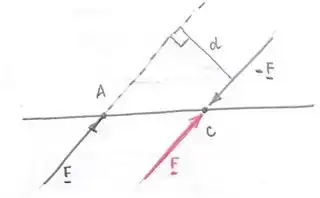If a rod is on a frictionless plane, and a force is applied on one of it's end, will there be both, translation + rotation motion? Also, if only a single force is applied on a body that does not pass through Centre of Mass, will it always produce rotation + translation?
2 Answers
Suppose that you have a force $\vec F$ acting at a point $A$ on the rod as shown in the diagram below.
Add two forces of equal magnitude but opposite in direction whose line of action is parallel to the original force but with those forces acting at the centre of mas.
This results in a force $F$ (red) acting through the centre of mass which provides the translation acceleration of the centre of mass and two forces $\vec F$ and $-\vec F$ (grey) which constitute a clockwise couple of magnitude $Fd$ which will produce the angular acceleration of the rod.
So if the line of action of the applied force does not go through the centre of mass of the rod you will always get a translational acceleration and a rotational acceleration.
- 104,498
Simple answer is that in a frictionless environment force will act on the center of mass to produce a linear acceleration. If the force is acting away from the center of mass ie off set and therefor forming a moment ( m x distance from the center of mass) then the acceleration will be angular and centered on the center of mass ie the rod will rotate in the direction of the applied force, around its center of mass
- 11
